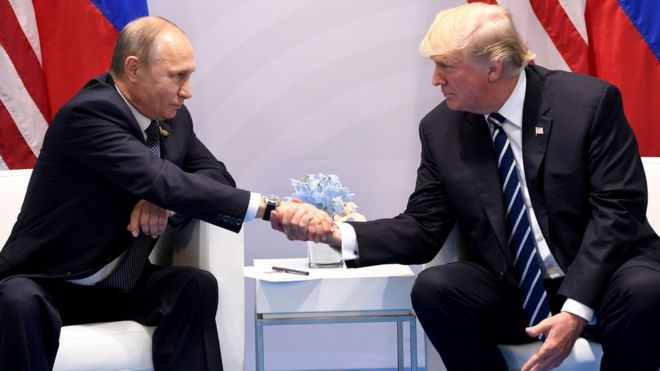 |
| The new bill may complicate President Trump's plans to improve relations with Russia |
The US House of Representatives has voted to impose fresh sanctions on Russia, despite President Donald Trump objecting to the legislation.
The bill is likely to complicate President Trump's hopes of improving relations with Russia.
It needs to be passed through the Senate before it can be sent on to the president to be signed.
The White House says it is reviewing the bill, and it is unclear whether the president will veto it.
"While the president supports tough sanctions on North Korea, Iran and Russia, the White House is reviewing the House legislation and awaits a final legislative package for the president's desk," White House spokeswoman Sarah Sanders said in a statement.
Russia's relationship with the president has dogged his first six months in office, amid allegations Moscow interfered to help Mr Trump get elected.
Mr Trump has also piled pressure on his attorney general over the Russia inquiry. He has publically labelled Jeff Sessions "weak" and said he was "disappointed" in Mr Sessions' decision to recuse himself from the investigation.
- Trump to decide fate of Sessions 'soon'
- Russia: The 'cloud' over the Trump White House
- How Trump's Russia trouble unfolded
The bill, which passed by 419 to three, was described by House Speaker Paul Ryan as a sanctions package that "tightens the screws on our most dangerous adversaries in order to keep Americans safe".
The planned sanctions on Russia were drawn up in part to further punish its annexation of Crimea in 2014. They will place new restrictions on oil and gas projects, affecting the Nord Stream 2 pipeline from Russia to Germany.
Lawmakers wary of Trump's pro-Moscow stance
By Barbara Plett, BBC state department correspondentThe legislation codifies sanctions imposed by Barack Obama over Russia's Ukraine interventions, which would make lifting them more difficult.
It also expands restrictions on doing business with Russian companies, in particular on energy development. That has the Europeans very worried they'll be penalised for supporting Russian pipeline projects.
But what concerns the White House is a measure that limits the president's traditional right to waive the sanctions: he would be forced to consult congress first. That and the broad bipartisan support for the legislation shows just how wary lawmakers are about Mr Trump's pro-Moscow approach.
The Senate had overwhelmingly passed an earlier version of the bill: the differences between the two have to be worked out before Mr Trump decides how to respond.
The White House has suggested the president may support the bill after some changes to the original draft, but he would have little room to manoeuvre anyway because Congress almost certainly has enough votes to override a veto.
Prior to the vote, Russian Deputy Foreign Minister Sergei Ryabkov said such measures would plant a "dangerous mine" under the foundation of ties.
Mr Ryabkov said: "All this is very worrying. We can see no signs that that Russophobe hysteria that has engulfed the entire US Congress is dying down."
After it passed, Russian MP Leonid Slutsky said the sanctions "undermine the prospects for the restoration of Russian-American relations and further complicate them for the foreseeable future".
"Opportunities for diplomatic manoeuvring" are now "extremely" small, he told Russia's Interfax news agency.
Next steps
If the legislation passes through the Senate, it would provide a headache for President Trump, who has signalled a more conciliatory approach towards Moscow.The president could veto the bill, but in doing so would fuel suspicion that he is too supportive of the Kremlin, correspondents say.
White House spokeswoman Sarah Huckabee Sanders said on Monday: "He's going to study that legislation and see what the final product looks like."
The US already has a raft of sanctions in place against Russian individuals and companies over Crimea. In December, following claims of election hacking, then President Barack Obama also expelled 35 diplomats and closed two Russian compounds in the US.
Six months of Trump
- How much has Trump achieved so far?
- What has Trump said about your country?
- Trump's promises before and after election
No comments:
Post a Comment